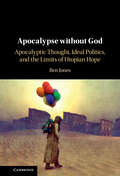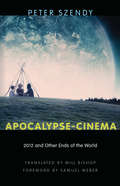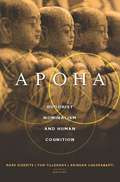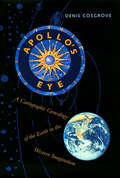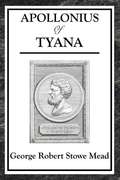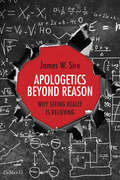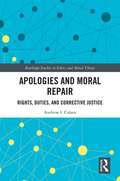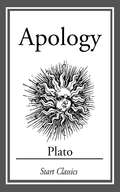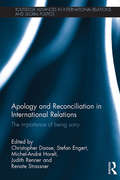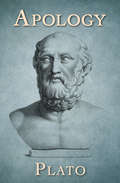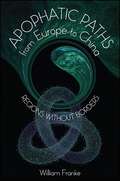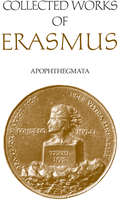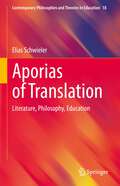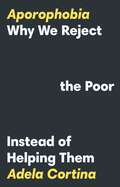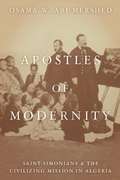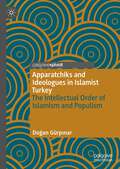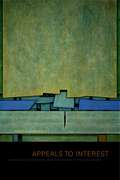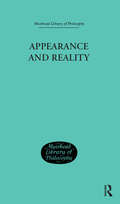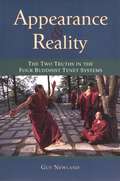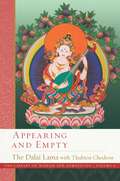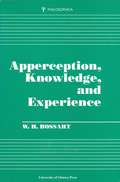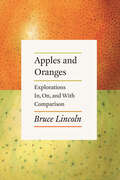- Table View
- List View
Apocalypse without God: Apocalyptic Thought, Ideal Politics, and the Limits of Utopian Hope
by Ben JonesApocalypse, it seems, is everywhere. Preachers with vast followings proclaim the world's end. Apocalyptic fears grip even the nonreligious amid climate change, pandemics, and threats of nuclear war. As these ideas pervade popular discourse, grasping their logic remains elusive. Ben Jones argues that we can gain insight into apocalyptic thought through secular thinkers. He starts with a puzzle: Why would secular thinkers draw on Christian apocalyptic beliefs – often dismissed as bizarre – to interpret politics? The apocalyptic tradition proves appealing in part because it theorizes a relation between crisis and utopia. Apocalyptic thought points to crisis as the vehicle to bring the previously impossible within reach, offering resources for navigating challenges in ideal theory, which involves imagining the best, most just society. By examining apocalyptic thought's appeal and risks, this study arrives at new insights on the limits of utopian hope. This title is available as open access on Cambridge Core.
Apocalypse-Cinema: 2012 and Other Ends of the World
by Peter SzendyApocalypse-cinema is not only the end of time that has so often been staged as spectacle in films like 2012, The Day After Tomorrow, and The Terminator. By looking at blockbusters that play with general annihilation while also paying close attention to films like Melancholia, Cloverfield, Blade Runner, and Twelve Monkeys, this book suggests that in the apocalyptic genre, film gnaws at its own limit.Apocalypse-cinema is, at the same time and with the same double blow, the end of the world and the end of the film. It is the consummation and the (self-)consumption of cinema, in the form of an acinema that Lyotard evoked as the nihilistic horizon of filmic economy. The innumerable countdowns, dazzling radiations, freeze-overs, and seismic cracks and crevices are but other names and pretexts for staging film itself, with its economy of time and its rewinds, its overexposed images and fades to white, its freeze-frames and digital touch-ups.The apocalyptic genre is not just one genre among others: It plays with the very conditions of possibility of cinema. And it bears witness to the fact that, every time, in each and every film, what Jean-Luc Nancy called the cine-world is exposed on the verge of disappearing.In a Postface specially written for the English edition, Szendy extends his argument into a debate with speculative materialism. Apocalypse-cinema, he argues, announces itself as cinders that question the “ultratestimonial” structure of the filmic gaze. The cine-eye, he argues, eludes the correlationism and anthropomorphic structure that speculative materialists have placed under critique, allowing only the ashes it bears to be heard.
Apoha: Buddhist Nominalism and Human Cognition
by Mark Tom Tillemans Arindam Chakrabarti Eds. SideritsWhen we understand that something is a pot, is it because of one property that all pots share? This seems unlikely, but without this common essence, it is difficult to see how we could teach someone to use the word "pot" or to see something as a pot. The Buddhist apoha theory tries to resolve this dilemma, first, by rejecting properties such as "potness" and, then, by claiming that the element uniting all pots is their very difference from all non-pots. In other words, when we seek out a pot, we select an object that is not a non-pot, and we repeat this practice with all other items and expressions.Writing from the vantage points of history, philosophy, and cognitive science, the contributors to this volume clarify the nominalist apoha theory and explore the relationship between apoha and the scientific study of human cognition. <P><P>They engage throughout in a lively debate over the theory's legitimacy. Classical Indian philosophers challenged the apoha theory's legitimacy, believing instead in the existence of enduring essences. Seeking to settle this controversy, essays explore whether apoha offers new and workable solutions to problems in the scientific study of human cognition. They show that the work of generations of Indian philosophers can add much toward the resolution of persistent conundrums in analytic philosophy and cognitive science.
Apollo's Eye: A Cartographic Genealogy of the Earth in the Western Imagination
by Denis CosgroveThis award-winning science history explores our evolving image of the globe—and how it has shifted our relationship to the world.Long before we had the ability to photograph the earth from space—to see our planet as it would be seen by the Greek god Apollo—images of the earth as a globe had captured popular imagination. In Apollo’s Eye, geographer Denis Cosgrove examines the historical implications for the West of conceiving and representing the earth as a globe: a unified, spherical body. Cosgrove traces how ideas of globalism and globalization have shifted historically in relation to changing images of the earth, from antiquity to the Space Age. He connects the evolving image of a unified globe to politically powerful conceptions of human unity.Winner of the Association of American Publishers Professional and Scholarly Publishing Award in Geography & Earth Sciences
Apollonius of Tyana
by George Robert Stowe MeadWith the exception of Christ, no more interesting personage appears upon the stage of Western history in those early years.
Apologetics Beyond Reason: Why Seeing Really Is Believing
by James W. Sire"Look carefully. Listen closely. Do you see? Do you hear? There are a million signposts pointing toward the specific truth of God in Christ. I've seen many of them. But God is speaking to you too. Look and see. Listen and hear." In this accessible and engaging work, veteran apologist Jim Sire gives us eyes to see the myriad "signals of transcendence" all around us that point to the specific truth of God in Christ. Focusing on the power of good literature—even from those who deny the existence of God—enables us to perceive and testify to God's reality in ways that rational argument alone cannot. "While reason can be very helpful in pointing us to God and helping us in our apologetics, what compels and convinces people is more multidimensional," says Sire. "What is needed is a more holistic apologetic that not only includes truth but also goodness and beauty." All inspiration is rooted in God the Creator, and some of God's truth lies buried until an artist exposes it. Good literature, written from a Christian standpoint or not, displays multiple examples of our human understandings of God, the universe and ourselves. It testifies to the existence of a transcendent realm and often, in fact, to the truth of the Christian faith.
Apologies and Moral Repair: Rights, Duties, and Corrective Justice (Routledge Studies in Ethics and Moral Theory)
by Andrew I. CohenThis book argues that justice often governs apologies. Drawing on examples from literature, politics, and current events, Cohen presents a theory of apology as corrective offers. Many leading accounts of apology say much about what apologies do and why they are important. They stop short of exploring whether and how justice governs apologies. Cohen argues that corrective justice may require apologies as offers of reparation. Individuals, corporations, and states may then have rights or duties regarding apology. Exercising rights to apology or fulfilling duties to provide them are ways of holding one another mutually accountable. By casting rights and duties of apology as justifiable to free and equal persons, the book advances conversations about how liberalism may respond to historic injustice. Apologies and Moral Repair will be of interest to scholars and advanced students in ethics, political philosophy, and social philosophy.
Apology
by PlatoThe Apology is Plato's version of the speech given by Socrates as he defended himself in 399 BC against the charges of "corrupting the young, and by not believing in the gods in whom the city believes, but in other daimonia that are novel . Apology here has its earlier meaning (now usually expressed by the word apologia ) of speaking in defense of a cause or of one's beliefs or actions. The Apology is divided into three parts. The first part is Socrates' own defense of himself and includes the most famous parts of the text, namely his recounting of the Oracle at Delphi and his cross-examination of Meletus. The second part is the verdict, and the third part is the sentencing
Apology and Reconciliation in International Relations: The Importance of Being Sorry (Routledge Advances in International Relations and Global Politics)
by Judith Renner Christopher Daase Stefan Engert Michel-André Horelt Renate StrassnerThis book looks into the role and effects of public apologies in international relations. It focuses on two major questions - why and when do states issue apologies for historic crimes and how and under what conditions are these apologies successful in remedying conflictive relationships? In recent years, we have witnessed an unseen popularity of apologies, with numerous politicians, managers and clergymen being eager to apologise and atone for the wrong-doings of their countries or institutions. Public apologies, thus, are a new and highly interesting, while nevertheless still puzzling phenomenon, the precise role and meaning of which in international politics remains to be explored. This book sets out to do exactly this. Focusing in particular on state apologies, it assembles twelve detailed empirical case studies which deal with the two questions raised above. In the first part, the case studies reconstruct the processes in which state representatives react to calls for public atonement, and in the second part the case studies explore the reactions to the apology and evaluate signs for its success or failure. All case studies are based on a theoretical framework which is outlined in the introduction to the book and helps develop tentative assumptions about the emergence and the effects of state apologies, drawing on different strands of literature, such as political science, philosophy, sociology or psychology. This work will be of great interest to students and scholars of conflict reconciliation, international relations and transitional justice.
Apology: Crito And Phaedo Of Socrates - Scholar's Choice Edition
by PlatoSocrates defends himself in court in this resounding speech, recounted firsthand by one of history&’s greatest philosophers. Plato&’s Apology is an account of the speech Socrates makes at the Athenian trial in which he is charged with not accepting the gods recognized by the state, inventing new deities, and corrupting the youth of Athens. Recounted by Plato, Socrates&’s speech is a rousing examination of integrity, wisdom, and the role of a philosopher. It is filled with wit, intelligence, and lessons that remain relevant today.
Apophatic Paths from Europe to China: Regions without Borders (SUNY series in Chinese Philosophy and Culture)
by William FrankeIn Apophatic Paths from Europe to China, William Franke brings his original philosophy of the unsayable, previously developed from Western sources such as ancient Neoplatonism, medieval mysticism, and postmodern negative theology, into dialogue with Eastern traditions of thought. In particular, he compares the Daoist Way of Chinese wisdom with Western apophatic thought that likewise pivots on recognizing the nonexistent, the unthinkable, and the unsayable. Leveraging François Jullien's exegesis of the Chinese classics' challenge to rethink the very basis of life and consciousness, Franke proposes negative theology as an analogue to the Chinese model of thought, which has long been recognized for its special attunement to silence at the limits of language. Crucial to Franke's agenda is the endeavor to discern and renew the claim of universality, rethought and reconfigured within the predicament of philosophy today considered specifically as a cultural or, more exactly, intercultural predicament.
Apophthegmata
by Elaine Fantham Desiderius Erasmus Betty I. Knott-SharpeAssembled for the young Prince William of Cleves, Erasmus' Apophthegmata consists of thousands of sayings and anecdotes collected from Greek and Latin literature for the moral education of the future ruler. Betty I. Knott and Elaine Fantham's annotated translation of the aphorisms and Erasmus' commentary on them makes this once popular literary and educational text accessible to modern audiences. The introduction discusses the origins of the Apophthegmata, the contents of the collection, and Erasmus' sources.
Aporias of Translation: Literature, Philosophy, Education (Contemporary Philosophies and Theories in Education #18)
by Elias SchwielerThis book proposes a new way for scholars in, for example, Education, Literary Studies, and Philosophy to approach texts and other phenomena through the concept and practice of translation. Its interdisciplinary perspective makes the book of value for graduate students and scholars in the Humanities and Social Sciences. The unique take on translation as related to the notion of aporia is applied to a number of seminal and classical texts within literature, poetry, and philosophy, which gives the reader new understandings of the workings of language and what happens within and between languages, as well as within and between disciplines, when some form of interpretation or analysis is at work. Importantly, the book develops the notion of aporias of translation as a way to learn and develop our understanding of texts and phenomena, and thus functions as a pedagogical process, which helps us come to terms with the boundaries of language and academic disciplines.
Aporophobia: Why We Reject the Poor Instead of Helping Them
by Professor Adela CortinaWhy “aporophobia”—rejection of the poor—is one of the most serious problems facing the world today, and how we can fight itIn this revelatory book, acclaimed political philosopher Adela Cortina makes an unprecedented assertion: the biggest problem facing the world today is the rejection of poor people. Because we can’t recognize something we can’t name, she proposes the term “aporophobia” for the pervasive exclusion, stigmatization, and humiliation of the poor, which cuts across xenophobia, racism, antisemitism, and other prejudices. Passionate and powerful, Aporophobia examines where this nearly invisible daily attack on poor people comes from, why it is so harmful, and how we can fight it.Aporophobia traces this universal prejudice’s neurological and social origins and its wide-ranging, pernicious consequences, from unnoticed hate crimes to aporophobia’s threat to democracy. It sheds new light on today’s rampant anti-immigrant feeling, which Cortina argues is better understood as aporophobia than xenophobia. We reject migrants not because of their origin, race, or ethnicity but because they seem to bring problems while offering nothing of value. And this is unforgivable in societies that enshrine economic exchange as the supreme value while forgetting that we can’t create communities worth living in without dignity, generosity, and compassion for all. Yet there is hope, and Cortina explains how we can overcome the moral, social, and political disaster of aporophobia through education and democratic institutions, and how poverty itself can be eradicated if we choose.In a world of migrant crises and economic inequality, Aporophobia is essential for understanding and confronting one of the most serious problems of the twenty-first century.
Apostles of Modernity: Saint-Simonians and the Civilizing Mission in Algeria
by Osama Abi-MershedInfluenced by the teachings of philosopher Henri de Saint-Simon (1760-1825), says Ali-Mershed (history, Georgetown U.), France's military Arabists making colonial policy for Algeria from 1830 to 1870 opposed native assimilation, and promoted what they called controlled association with the Muslims. Following him, they contested the existence of primordial human racial and cultural racial and cultural characteristics, he explains, and insisted that societies at different stages of historical development should evolve within their particular institutional structures and cultural traditions. He describes how their discretionary control over the Arab territories provided them a human laboratory for their experiments with Saint-Simonian reforms, and the geographic space to erect a semi-autonomous and protected Arab Kingdom. Annotation ©2010 Book News, Inc., Portland, OR (booknews.com)
Appalachian Set Theory 2006-2012
by James Cummings Ernest SchimmerlingThis volume takes its name from a popular series of intensive mathematics workshops hosted at institutions in Appalachia and surrounding areas. At these meetings, internationally prominent set theorists give one-day lectures that focus on important new directions, methods, tools and results so that non-experts can begin to master these and incorporate them into their own research. Each chapter in this volume was written by the workshop leaders in collaboration with select student participants, and together they represent most of the meetings from the period 2006-2012. Topics covered include forcing and large cardinals, descriptive set theory, and applications of set theoretic ideas in group theory and analysis, making this volume essential reading for a wide range of researchers and graduate students.
Apparatchiks and Ideologues in Islamist Turkey: The Intellectual Order of Islamism and Populism
by Doğan GürpınarThis book analyzes how AKP’s embedded intellectuals operate as media spin doctors, exploring their transformation from passionately engaged intellectuals into apparatchiks. This project adapts a post-Soviet geography approach to the media, intelligentsia, and political discourse as derivative of authoritarian regimes to the Turkish context. It offers a fresh look at the Turkish political and intellectual scene and a comparative study of the populist-authoritarian politics of Turkey. Situated in the literature on the post-Soviet authoritarian regimes and their ways of governing, as well as their manipulation of public opinion, the book analyzes AKP-aligned intellectuals as apparatchiks. Gürpınar explores the different constellations of pro-AKP intellectuals vindicating the AKP regime from various angles, including: liberal/progressive intellectuals who initially supported the party for its liberal vistas but continued their support by twisting their progressive rhetoric; Islamist intellectuals blending their Islamism with populism; and national security intellectuals who joined after the AKP came to propagate a national security agenda. The book also provides an overview of the mechanisms of political technology, including the media landscape and its running by the AKP, intellectuals themselves as operators of political technology, and the problem of “cultural power.” The book will be of interest to those studying comparative authoritarian politics, populism, political communication, and scholars of Middle East and Eastern Europe.
Appeals to Interest: Language, Contestation, and the Shaping of Political Agency
by Dean MathiowetzIt has become a commonplace assumption in modern political debate that white and rural working- and middle-class citizens in the United States who have been rallied by Republicans in the “culture wars” to vote Republican have been voting “against their interests.” But what, exactly, are these “interests” that these voters are supposed to have been voting against? It reveals a lot about the role of the notion of interest in political debate today to realize that these “interests” are taken for granted to be the narrowly self-regarding, primarily economic “interests” of the individual. Exposing and contesting this view of interests, Dean Mathiowetz finds in the language of interest an already potent critique of neoliberal political, theoretical, and methodological imperatives—and shows how such a critique has long been active in the term’s rich history. Through an innovative historical investigation of the language of interest, Mathiowetz shows that appeals to interest are always politically contestable claims about “who” somebody is—and a provocation to action on behalf of that “who.” Appeals to Interest exposes the theoretical and political costs of our widespread denial of this crucial role of interest-talk in the constitution of political identity, in political theory and social science alike.
Appeals to Interest: Language, Contestation, and the Shaping of Political Agency
by Dean MathiowetzIt has become a commonplace assumption in modern political debate that white and rural working- and middle-class citizens in the United States who have been rallied by Republicans in the “culture wars” to vote Republican have been voting “against their interests.” But what, exactly, are these “interests” that these voters are supposed to have been voting against? It reveals a lot about the role of the notion of interest in political debate today to realize that these “interests” are taken for granted to be the narrowly self-regarding, primarily economic “interests” of the individual. Exposing and contesting this view of interests, Dean Mathiowetz finds in the language of interest an already potent critique of neoliberal political, theoretical, and methodological imperatives—and shows how such a critique has long been active in the term’s rich history. Through an innovative historical investigation of the language of interest, Mathiowetz shows that appeals to interest are always politically contestable claims about “who” somebody is—and a provocation to action on behalf of that “who.” Appeals to Interest exposes the theoretical and political costs of our widespread denial of this crucial role of interest-talk in the constitution of political identity, in political theory and social science alike.
Appearance and Reality: A Metaphysical Essay (Cambridge Library Collection - Philosophy Ser.)
by Bradley, F HFirst published in 2002. Routledge is an imprint of Taylor & Francis, an informa company.
Appearance and Reality: The Two Truths in the Four Buddhist Tenet Systems
by Guy NewlandWhen someone seeks to understand Buddhism, where should that person start? With the meaning of taking refuge in the three jewels? With the four noble truths? The Dalai Lama, when asked this question, suggested that for many in the West today, understanding the two truths—conventional truth and ultimate truth—is the best place to start. When the Buddha awoke from the dream we still dream, he saw the ultimate reality of things just as they are. There are shifting appearances and conventions, the manners and traditions of the vast and diverse world; and then there is the mystery of the sheer reality of things. And yet we cannot find this reality anywhere else but right here. Each system of Buddhist philosophy has its own way of explaining exactly what these two truths are and how they relate to one another. In exploring these systems, we are looking over the shoulders of Buddhist thinkers as they grapple with a basic question: 'What is real?' This is not an idle intellectual exercise but a matter which cuts to the heart of our practice in life.
Appearing and Empty (The Library of Wisdom and Compassion #9)
by Venerable Thubten Chodron His Holiness the Dalai LamaIn this final volume on emptiness, the Dalai Lama skillfully reveals the Prasangikas&’ view of the ultimate nature of reality so that we will gain the correct view of emptiness, the selflessness of both persons and phenomena, and have the means to eliminate our own and others&’ duhkha.In this last of three volumes on emptiness, the Dalai Lama takes us through the Sautrantika, Yogacara, and Svatantrika views on the ultimate nature of reality and the Prasangikas&’ thorough responses to these, so that we gain the correct view of emptiness—the selflessness of both persons and phenomena. This view entails negating inherent existence while also being able to establish conventional existence: emptiness does not mean nothingness. We then learn how to meditate on the correct view by cultivating pristine wisdom that is the union of serenity and insight as taught in the Pali, Chinese, and Tibetan traditions. Such meditation, when combined with the altruistic intention of bodhicitta, leads to the complete eradication of all defilements that obscure our minds. This volume also introduces us to the tathagatagarbha—the buddha essence—and how it is understood in both Tibet and China. Is it permanent? Does everyone have it? In addition, the discussion of sudden and gradual awakening in Zen (Chan) Buddhism and in Tibetan Buddhism is fascinating.
Apperception, Knowledge and Experience
by W. H. BossartBossart discusses the alleged losses of faith and self in postmodernist thought in the light of the "triumph" and subsequent decline of the transcendental turn in philosophy initiated by Kant.
Apples and Oranges: Explorations In, On, and With Comparison
by Bruce LincolnComparison is an indispensable intellectual operation that plays a crucial role in the formation of knowledge. Yet comparison often leads us to forego attention to nuance, detail, and context, perhaps leaving us bereft of an ethical obligation to take things correspondingly as they are. Examining the practice of comparison across the study of history, language, religion, and culture, distinguished scholar of religion Bruce Lincoln argues in Apples and Oranges for a comparatism of a more modest sort. Lincoln presents critiques of recent attempts at grand comparison, and enlists numerous theoretical examples of how a more modest, cautious, and discriminating form of comparison might work and what it can accomplish. He does this through studies of shamans, werewolves, human sacrifices, apocalyptic prophecies, sacred kings, and surveys of materials as diverse and wide-ranging as Beowulf, Herodotus’s account of the Scythians, the Native American Ghost Dance, and the Spanish Civil War. Ultimately, Lincoln argues that concentrating one's focus on a relatively small number of items that the researcher can compare closely, offering equal attention to relations of similarity and difference, not only grants dignity to all parties considered, it yields more reliable and more interesting—if less grandiose—results. Giving equal attention to the social, historical, and political contexts and subtexts of religious and literary texts also allows scholars not just to assess their content, but also to understand the forces, problems, and circumstances that motivated and shaped them.
